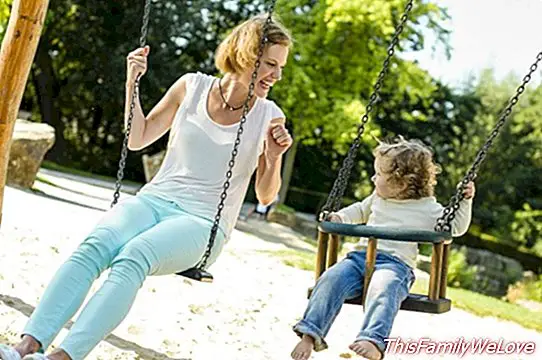6 guidelines to educate children about courage

In a natural way, if a child is given the opportunity to do something, he will respond with force and will fight to achieve it. There is more to see how they struggle from the first moment to be born or to get to feed themselves, without barely having a few minutes of life and without knowing that they can count on us. The courage born from the motivation to want to move forward and achieve a goal.
But, this motivation has to be sincere and real. Many times it happens that we try to give them the opportunity and we want them to see that we trust them, but deep down we think that they will not get it and end up perceiving this doubt, which ends up being a mistake if what we want in educate children in bravery.
We worry a lot about not letting them make mistakes, to avoid suffering, but we only manage to stop trying. When they fail, it is not time to scold them because if we do, next time they will not try. It has taken a lot of effort, they have not achieved it and they also get a reprimand from their parents.
Concrete guidelines to educate in courage
- Avoid overprotection. Increasingly we find ourselves with overprotected children and, therefore, limited in their own growth and development. The overprotection is difficult to recognize to the parents since it is the result of an inadequate interpretation of the affectivity towards the children and arises precisely because of wanting to give them the best. However, we fall into the error that what we think is the best becomes just the opposite. In a certain way, it may even be selfish because we do not want to see them suffer because of the suffering that we also suffer, but it is worth making the effort to allow them to get confused by the positive consequences that it has, although initially it does not seem that way.
- Do not decide for them. There are many occasions in which we are going to find ourselves in situations where we know that the decision they are making is probably not the most appropriate, but in spite of that, we have to let them be the ones who realize or that life shows them that they have not made the best decision. This attitude is positive for two reasons: for the learning it entails and because although we think it is not a good decision it is important that they try and be able to do it. We must not advance or decide for them.
- Prepare them for what may come. What we can help them with is preparing them for the consequences of trying to be brave. This means that if they do, they have to be happy and proud to have achieved it and if not, happy to have tried it. If we believe that it may cost them to get it, prepare them for the difficulties that can be encountered. For example, if they are excited to participate in a drawing competition, make them aware that there may be other children with a high level, make them appreciate that the rest of the participants can present very good drawings, they may have more time in class than they, that they are older, that they know more techniques ... In some way, help them to situate themselves in a reality as accurate as possible so that their expectations are not wrong, but at no time to disappoint or demotivate them. You have to try to do it with a certain balance and, above all, with great care and affection.
- Give them examples to help them choose challenges and motivations. When they are little they have great impulses to know the world, to discover it, they are brave little ones. As they grow, their fears invade them and the impulses to try the new and to discover the world are less. This is something that usually happens more towards the Primary stage, that is why in these ages we parents have to motivate them towards new challenges, suggest illusions or projects so that we can go little by little making them brave children.
- Be a model. As in the entire teaching-learning process, children need good models and references to know where they should go and how they have to do things. If we pretend that they are brave children we will have to be courageous parents, who see in us people with challenges, objectives, hope for improvement, capacity for effort and struggle to achieve those exciting challenges and daily and constant effort, overcoming each of the possible difficulties to be able to get it. There is nothing that can motivate them more than being able to get things done as their parents do and, especially, in the early stages we must not forget that we are for them their great idols and heroes. This can also serve us as a motivation not to abandon us, to continue growing and improving as people. When we are parents we focus so much on giving them that we often forget about ourselves, but we can give more if we are better.
- Value your effort. The fundamental thing is that we value each one of the efforts, steps and progress that they are achieving. Our recognition is your greatest success and your greatest motivation.
María Campo Director of NClic




